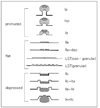Abstract
Colorectal cancer is the most common cancer of the digestive tract in western countries. In Korea, its mortality rate has markedly increased in recent 15 years. The mortality of colon cancer can be decreased by proper screening and subsequent polypectomy. Early colon cancer is defined as colon cancer that infiltrates within mucosa and submucosa regardless of lymph nodes invasion and has favorable outcomes. It can be easily removed by endoscopic procedures. The depth of submucosal invasion should be determined before endoscopic removal by various parameters, such as shape, pit patterns by magnifying endoscopy, and endoscopic ultrasonography. After endoscopic removal, the tissue specimen should be carefully examined for the completeness of the removal.
References
1. Day DW, Jass JR, Price AB, Shepherd NA, Sban JM, Williams GT, et al. Morson & Dawson's gastrointestinal pathology. 2003. 4th ed. Oxford: Blackwell.
2. Hamilton SR, Aaltonen LA, editors. WHO classification of tumors. Pathology and genetics of tumors of the digestive system. 2000. Lyon: IARC.
3. Shimoda T, Ikegami M, Fujisaki J, Matsui T, Aizawa S, Ishikawa E. Early colorectal carcinoma with special reference to its development de novo. Cancer. 1989. 64:1138–1146.

4. Schlemper RJ, Kato Y, Stolte M. Review of histological classifications of gastrointestinal epithelial neoplasia:differences in diagnosis of early carcinomas between Japanese and Western pathologists. J Gastroenterol. 2001. 36:445–456.

5. Park IS, Lee YC, Kim WH, Noh SH, Lee KS, Kim H. Clinicopathologic characteristics of early gastric cancer in Korea. Yonsei Med J. 2000. 41:607–614.

7. Han D, Sohn JH, Cho YJ, Jeon YC, Kim HJ, Chang SJ, et al. Flat depressed early colon cancer-a case report. J Korean Med Sci. 1997. 12:465–468.

8. Yamano H, Kudo S, Tamegai Y, Imai Y. Macroscopic classification of early colorectal carcinoma. Stomach and Intestine. 2000. 35:1485–1490.
9. The Paris endoscopic classification of superficial neoplastic lesions:esophagus, stomach, and colon:November 30 to December 1, 2002. Gastrointest Endosc. 2003. 58:Suppl 6. S3–S43.
10. Bond JH. Polyp guideline:diagnosis, treatment, and surveillance for patients with colorectal polyps. Practice Parameters Committee of the American College of Gastroenterology. Am J Gastroenterol. 2000. 95:3053–3056.
11. Volk EE, Goldblum JR, Petras RE, Carey WD, Fazio VW. Management and outcome of patients with invasive carcinoma arising in colorectal polyps. Gastroenterology. 1995. 109:1801–1807.

12. Ajioka Y, Watanabe H, Kazama S, Hashidate H, Yokoyama J, Nishikura K, et al. Early colorectal cancer with special reference to the superficial nonpolypoid type from a histopathologic point of view. World J Surg. 2000. 24:1075–1080.

13. Kudo S, Rubio CA, Teixeira CR, Kashida H, Kogure E. Pit pattern in colorectal neoplasia:endoscopic magnifying view. Endoscopy. 2001. 33:367–373.

14. Nagata S, Tanaka S, Haruma K, Yoshihara M, Sumii K, shinamoto F, et al. Pit pattern diagnosis of early colorectal carcinoma by magnifying colonoscopy:clinical and histological implications. Int J Oncol. 2000. 16:927–934.
15. Tanaka S, Nagata S, Oka S, Kuwai T, Tamura T, Chayama K, et al. Determining depth of invasion by VN pit pattern analysis in submucosal colorectal carcinoma. Oncol Rep. 2002. 9:1005–1008.

17. Tanimoto T, Tanaka S, Haruma K, Yoshihara M, Sumii K, Shinamoto F, et al. Growth patterns in various macroscopic types of noninvasive intramucosal colorectal carcinoma with special reference to apoptosis and cell proliferation. Dis Colon Rectum. 1998. 41:1376–1384.

18. Tanaka S, Oka S, Chayama K. Advances of an internal treatment for early colorectal carcinoma. Nippon Shokakibyo Gakkai Zasshi. 2004. 101:486–494.
19. Tanaka S, Nagata S, Oka S, Kuwai T, Tamura T, Chayama K. Treatment of colorectal carcinoma having submucosal invasion. Nippon Rinsho. 2003. 61:Suppl 7. 286–290.




 PDF
PDF ePub
ePub Citation
Citation Print
Print






 XML Download
XML Download